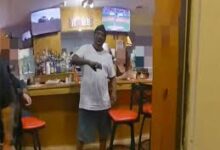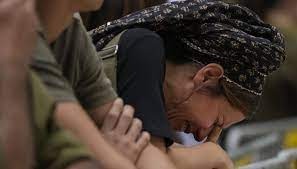Trump and Capitol Hill protesters face charges as the US Supreme Court hears arguments over obstruction laws
The first of two cases that the Supreme Court will consider on Tuesday might have an impact on the criminal prosecution of former President Donald Trump for his attempts to reverse his defeat in the 2020 election. There are also hundreds of accusations related to the Capitol disturbance that are in question.

Arguments about the accusation of obstructing an official procedure are being heard by the justices. 330 individuals are facing this accusation, which is based on a statute that was enacted more than 20 years ago in the wake of the Enron financial debacle, according to the Justice Department. The court will decide whether it may be applied to individuals who interfered with Congress certifying Joe Biden’s win over Trump in the 2020 presidential election.
In the case handled by special counsel Jack Smith in Washington, the former president and presumed Republican contender for 2024 is facing two counts that might be dismissed with a favorable decision from the country’s highest court. The question of whether Trump has “absolute immunity” from prosecution in the case—a claim that has already been rejected by two lower courts—will be heard by the justices next week.
Trump, the first former president of the United States to be charged with a crime, is on trial in New York on allegations related to hush money. He is also facing charges in Georgia and Florida for allegedly manipulating elections and mishandling secret materials.
The court is hearing Joseph Fischer’s appeal on Tuesday. Fischer is a former Pennsylvania police officer who was charged with seven counts, including obstruction, for his actions on January 6, 2021, when a crowd of Trump supporters stormed the Capitol building in an attempt to prevent Democratic candidate Joe Biden from winning the presidency. Fischer’s attorneys contend that the accusation does not apply to his actions.
One of the most common felonies in the large federal prosecution that followed the tragic revolt is obstruction, which carries a maximum sentence of 20 years in prison.
Approximately 170 defendants, including the leaders of two far-right extremist organizations, the Proud Boys and Oath Keepers, were found guilty of impeding or conspiring to hinder the Jan. 6 joint session of Congress. The sentence of many offenders has been postponed until after the justices have rendered a decision.
US legislators are attempting to blame Donald Trump for the Capitol Hill storm on January 6.
On January 6, 2021, supporters of Donald Trump take part in a rally in Washington. According to the Justice Department, 330 people are accused with obstructing an official procedure, and the Supreme Court will hear arguments on the matter on Tuesday, April 16, 2024.
Over 160 investigations against Capitol Hill rioters have been initiated by the FBI.
Because they were worried they would serve longer than necessary in the event that the Supreme Court ruled against the Justice Department, some rioters have even been granted early release from jail while the appeal is underway. This includes Kevin Seefried, a Delaware resident who rushed the Capitol while threatening a Black police officer with a pole connected to a Confederate battle flag. Seefried was given a three-year jail sentence last year, but a court recently decided to let him out one year into his sentence as he awaited the Supreme Court’s decision.
The main question in the high court case is whether the defendants from January 6 may be held accountable for violating the anti-obstruction clause of a statute that was passed in 2002 in reaction to the financial crisis that brought down Enron Corp.
The goal of the clause, according to Fischer’s attorneys, was to prevent documents from being destroyed in response to an inquiry and to address a legal gap. They informed the court that, up to the Capitol riot, all criminal cases using this clause included accusations of record-destroying or other forms of manipulation.
But the administration claims that the other side is interpreting the law too narrowly, claiming that it covers Fischer’s “alleged conduct in joining a violent riot to disrupt the joint session of Congress certifying the presidential election results” and that it acts “as a catchall offense designed to ensure complete coverage of all forms of corrupt obstruction of an official proceeding.”
In the immunity case, Smith has said on his own that the obstruction accusations against Trump are legitimate regardless of Fischer’s verdict.
The majority of judges from lower courts who have made a decision have upheld the charge. Among them was Trump appointment U.S. District Judge Dabney Friedrich, who said that “statutes often reach beyond the principal evil that animated them.”
However, another Trump appointment, U.S. District Judge Carl Nichols, dropped the indictment against Fischer and the other two defendants, stating that the prosecution had gone too far. Before the Supreme Court decided to take up the case, a split panel of the federal appeals court in Washington restored the allegation.
Although it is not relevant to the Supreme Court case, Fischer’s activities on January 6 are described by the two sides in radically different ways. Fischer entered the Capitol after Congress had adjourned, according to his attorneys, who claim he “was not part of the mob” that drove members from the House and Senate chambers. Fischer was driven into a line of police inside by the weight of the crowd, they said in a court document.
On January 6, 2021, supporters of Donald Trump take part in a rally in Washington. According to the Justice Department, 330 persons are accused with obstructing an official procedure, and the Supreme Court will hear arguments on the matter on Tuesday, April 16, 2024.
The Capitol Attack illustrates the decades-long growth of US extremism
Among the 23 Republican members of Congress who feel the administration’s use of the obstruction charge “presents an intolerable risk of politicized prosecutions” are Sen. Tom Cotton of Arkansas, Reps. Jim Jordan of Ohio, Lauren Boebert of Colorado, Matt Gaetz of Florida, and Marjorie Taylor Greene of Georgia. The insanity will only end with a categorical censure from this Court.
According to the Justice Department, Fischer can be heard screaming “Charge!” on camera as he pushed his way through the throng and “crashed into the police line.” Fischer said on social media during the disturbance, “we pushed police back about 25 feet,” and prosecutors also point to texts he made before January 6 in which he warned that things may go ugly.
Over 1,350 persons have been accused with federal offenses connected to the Capitol disturbance. Roughly one thousand of them have entered guilty pleas or, after a trial, been found guilty by a jury or judge.







